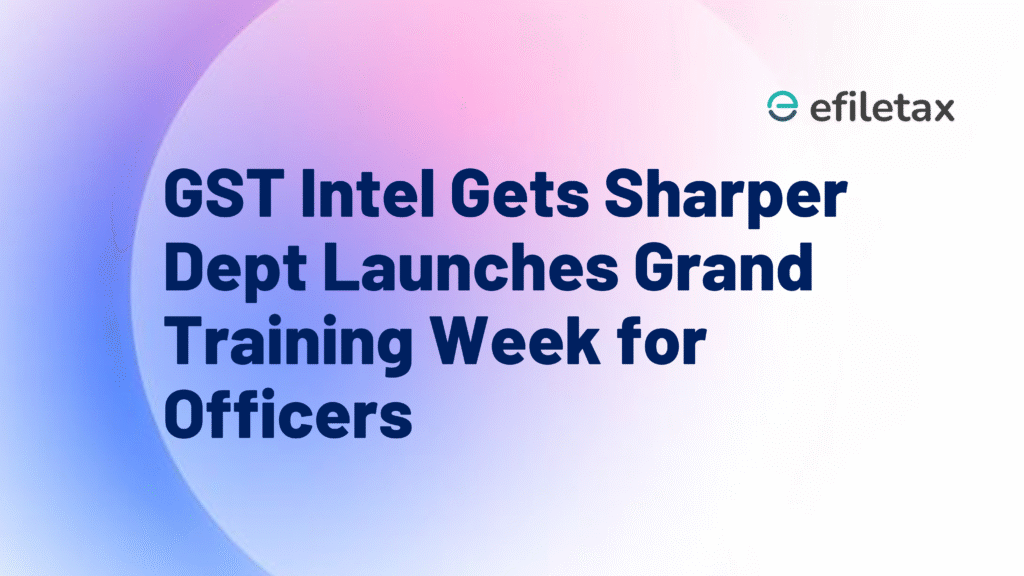
GST Training for Intelligence Wing Begins Across India
The GST training for intelligence wing has kicked off with a week-long national programme launched by the CBIC. Aimed at strengthening GST intelligence and enforcement mechanisms, this initiative is part of CBIC’s broader strategy to boost compliance, curb tax evasion, and upskill officers with digital investigation tools.
Why This Matters for Indian Taxpayers
The GST intelligence wing plays a crucial role in:
- Tracking fake invoices and bogus ITC claims
- Curbing tax frauds through real-time alerts
- Conducting anti-evasion drives and raids
- Ensuring data-driven audits and investigations
This training upgrade means the GST ecosystem will become more vigilant, faster, and tech-enabled in identifying irregularities.
Who’s Organising the Training?
The Central Board of Indirect Taxes and Customs (CBIC) has organised this national GST training drive, coordinated by its Directorate General of GST Intelligence (DGGI) and the National Academy of Customs, Indirect Taxes & Narcotics (NACIN).
💡 Expert Tip:
As enforcement becomes sharper, businesses must ensure:
- E-invoicing compliance
- Proper ITC documentation
- Real-time GST return filing
- Vendor GST health checks
Focus Areas of the GST Intelligence Training
The training includes both theoretical and hands-on learning sessions on:
| Focus Area | Training Coverage |
|---|---|
| Data Analytics & AI Tools | Use of AI for risk assessment, red flagging fake firms, and pattern detection |
| Forensic Accounting | Spotting layering of transactions and invoice mismatches |
| Legal Procedures | Proper invocation of Sections 67, 74, 122 and 132 of the CGST Act |
| Inter-departmental Sharing | Collaboration with Income Tax, ED, MCA, and FIU-India |
| Case Study Simulations | Real-world examples of fake ITC rackets and how to bust them |
Legal Angle: Why This Update Is Important
According to Section 67 of the CGST Act, officers can inspect premises, seize records, and detain goods if there is a reason to believe that tax evasion is happening.
Also, under Section 132, offences like issuing fake invoices or availing fraudulent ITC above ₹5 crore can lead to arrest and prosecution.
With this training, the GST intelligence wing is expected to invoke these sections more effectively and reduce litigation gaps.
🔗 Read CGST Act provisions on CBIC.gov.in
What Taxpayers Should Do Now
To stay safe and compliant in this changing enforcement climate:
✅ Reconcile GSTR-2B with books monthly
✅ Don’t deal with non-compliant vendors
✅ Avoid circular trading or dummy billing
✅ Keep invoice trails clean and audit-ready
✅ Consult professionals for GST health checks
How Efiletax Can Help
- End-to-end GST return filing
- E-invoicing automation
- Vendor verification reports
- GST audit support for SMEs and startups
👉 Explore GST services at Efiletax.in
Summary
GST training for intelligence wing has started nationwide, focusing on tech-led enforcement, fake invoice detection, and legal procedures under the CGST Act. Businesses must tighten compliance to avoid penalties.
FAQs
Q1. Who is conducting the GST training for intelligence officers?
CBIC through NACIN and DGGI has rolled out this national training week.
Q2. What topics are covered in this training?
It includes data analytics, forensic audits, and real-life case busting simulations.
Q3. Will this impact regular GST taxpayers?
Yes, enforcement will become more tech-driven and targeted, so compliance is critical.
Q4. What’s the penalty for fake ITC under GST?
Fake ITC above ₹5 crore can lead to arrest and prosecution under Section 132 of the CGST Act.